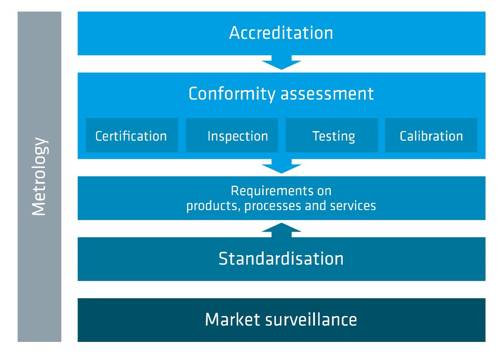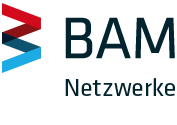Source: BAM
QI-FoKuS aims to close this gap with the help of surveys of German companies and conformity assessment bodies.
QI-FoKuS Flyer 2021 (PDF)
The QI-FoKuS Initiative was initiated by the Bundesanstalt für Materialforschung und -prüfung (Federal Institute for Materials Research and Testing – BAM), Department for Accreditation and Conformity Assessment, and the Department of Innovation Economics at Technische Universität Berlin (TU Berlin) under Prof. Knut Blind.
A network of quality infrastructure institutions and industry associations supports our initiative. The project is funded by BAM.
QI-FoKuS is supported by the Federal Ministry for Economic Affairs and Energy (BMWi).
QI-FoKuS aims to improve our understanding of the elements of QI and their interactions.
QI-FoKuS thus contributes to:
- creating a data base for new scientific findings on the influencing factors and effects of conformity assessment and accreditation,
- identifying mechanisms of action,
- identifying necessary changes resulting from technical and economic developments at an early stage,
- identifying current trends in conformity assessment and accreditation and the resulting need for regulation, and
- informing political decision-makers, industry, and the public in a professional manner through evidence-based argumentation on conformity assessment and accreditation.

National quality infrastructure graphic
Source: BAM / TU Berlin
As part of the QI-FoKuS initiative, data are collected and evaluated with the help of surveys of companies, in particular conformity assessment bodies. The conceptual development of the studies, the data collection via surveys, and the data evaluation and processing are carried out by the Bundesanstalt für Materialforschung und -prüfung (BAM), in cooperation with the Technische Universität Berlin, Department of Innovation Economics, under Professor Knut Blind, who initiated the German Standardization Panel (DNP).
All information will be treated absolutely confidentially and will only be used anonymously for statistical evaluations. A summary of the results will be published on this website. The data will also be made available in a suitable form for research and consulting purposes.
Provide decision-making guidance
The results of our analyses can serve not only as a decision guidance for actors in politics, they are also a valuable source of information for companies and conformity assessment and accreditation bodies, helping them to better assess and respond to current and future challenges.


